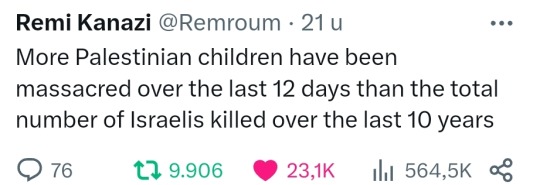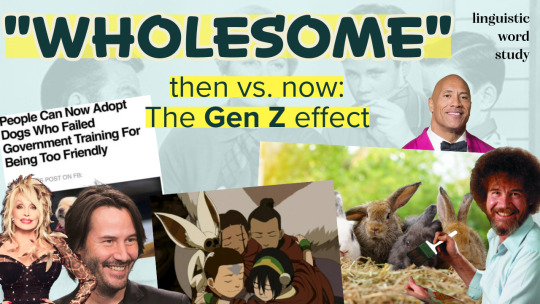#semantics
Text

Table with the partinioning of the TREE-WOOD-FOREST semantic domain.
Georgakopoulos, Thanasis & Stéphane Polis. 2018. The semantic map model: State of the art and future avenues for linguistic research. Language and Linguistics Compass 12(2). e12270. https://doi.org/10.1111/lnc3.12270.
#table#semantics#Thanasis Georgakopoulos#Stéphane Polis#2018#Language and Linguistics Compass#semantic maps#typology#lingblr#linguistics
79 notes
·
View notes
Text

Something to consider when people call this a "conflict" or "war". Semantics matter.
This is a genocide
#semantics#words#literature#books#tv shows#mcu#marvel#disney#israel#palestine#world#trending#tiktok#viral#movies#moon knight#marc spector#steven grant#jake lockley#fanfic
1K notes
·
View notes
Text
Incorrect Batfam Quotes
Jason: What is wrong with you?
Tim: Well, when I realized the dopamine hit I received from being a smartass far outweighed the repercussions, there was no turning back for the outcome of my personality.
#incorrect batfamily quotes#incorrect dc quotes#incorrect quotes#incorrect justice league quotes#dc comics#batman#batman & robin#robin#justice league#batfamily#batfam#tim drake#red robin#jason todd#red hood#batbros#source: tiktok#technically my source is the purple felt puppet guy who’s name I’m blanking on rn#semantics#comics
844 notes
·
View notes
Text

Page 7
- Previous Page - Title Card - Next Page -
#artwork#comic#digital art#fan comic#mario#mario bros#mario movie#nintendo#procreate#super mario#super mario bros movie#wrecking crew#video games#mario fanart#page 7#technically you can still grow a stach and not be an adult#but yknow#semantics
235 notes
·
View notes
Text
"I take it there is no Mr. Ogg?" he said, eventually.
"Oh, yes, there's a Mr. Ogg," said Nanny. "We buried him years ago. Well, we had to. He was dead."
Terry Pratchett, Lords and Ladies
#casanunda#nanny ogg#lords and ladies#discworld#terry pratchett#courtship#small talk#awkward#widowed#necessity#semantics#we buried him years ago
178 notes
·
View notes
Text
Yes I do consider it a MASSIVE red flag when someone only ever refers to women as “females”!
That’s nasty, creepy shit!
Incel behaviour!
I can look past it when the Ferengi do it.
But not in real life!
Side Note: TERFs please stay far away from this post. Your bigotry and neurotypical ableism are not wanted here.
Keep that shit in the Tory Party.
Anyways
#dougie rambles#personal stuff#incels#fuck incels#restraining order#words#semantics#ferengi#reblog this#reblog the shit out of this#feel free to reblog#fuck TERFs#fuck tories#fuck brexit#tangentially#gender#biology#terminology#science#and the like
89 notes
·
View notes
Text
as a huge unreliable narrator enjoyer i love the fact that the raven tower is narrated by someone who cannot lie. so the narration is not unreliable, and any kind of uncertainty is always couched in "here is a story i have heard" or "i imagine", but it scratches the same itch as unreliable narration because the evidentiality of the narration is still so central, just in the opposite way. stories that don't care about where the narrator is getting their information or what biases are present in the way that information is shared with us are on one end of a spectrum, and stories that do care about those things are on the other end, and the raven tower is firmly situated alongside the unreliably narrated stories even though the whole point is that the narrator is as motivated as it is possible to be to never say something that is untrue. and it's fascinating to see how ann leckie manages to build suspense and subvert expectations without really at any point deliberately misleading the reader. every time i reread one of her books, the bouncing of the dvd screensaver in my brain gets a little more frenetic. how does she do what she does. ann leckie what is your secret.
#this post is spoiler-free btw. the narrator is very upfront about the fact that it can't lie and says this very early in the story#i'm only like 40% through my reread and i don't remember any details of what happens but i'm already losing it#and the fact that it's first-person second-person narration...completely undivorceable from the conceit of the book#might write a different post about that but probably only after i finish rereading#i finally got my sister to agree to read it and she's like 'i read the first fifteen pages! i like the style'#and i'm barely restraining myself from being like girl please read another fifty pages and get back to me#if you are not frothing at the mouth by page 100 then your money back. guaranteed.#my sister loves semantics like the linguistic subfield of semantics so i've been begging her to read this for so many years...#like i KNOW she will love it when that stuff starts becoming apparent. which is remarkably early in the book#hrrrrhughghrhrrgh i want to talk about it so bad#the raven tower#ann leckie#my posts#unreliable narrators#or not!!! actually!!!#storytelling#semantics
78 notes
·
View notes
Text
Occasionally people ask me the specific difference between Wizards and Sorcerers.
This is how I see it.
Most people oversimplify wizards by saying they learn their magic from books. While the spells and techniques they use are often passed down through writing, the true quality of a wizard is their method of interaction with magic. Wizards, as far as I have deduced, use magic like a tool. They wield magic and use it to enact their will.
Sorcerers are different, and the difference again lies in the method of use. Sorcerers do not wield magic like one would a sword or hammer, but rather we channel magic as a natural conduit for its energies. We act as receptacles for magic, allowing it to live inside us so our will becomes intertwined with its own.
Wizards are the hands that make and mold. Sorcerers are the cups that contain and dispense.
This difference is subtle but important. While a wizard may abandon a magical goal at any time, sorcerers risk becoming consumed by it until completion. Wizards on the other hand are limited by their resources, knowledge, and ability; while a sorcerer needs only the magic they have stored within their heart, or otherwise a reasonable source to draw from.
103 notes
·
View notes
Text
He is way nicer than I'll ever be
93 notes
·
View notes
Text
It's super convenient for trolling purposes that nearly every game that's popularly claimed to be the Best Game Ever is part of a massive, endlessly serialised franchise, because it means you can always derail a discussion by playing the not-even-the-best-X-in-the-Y card (e.g., "Ocarina of Time isn't even the best game in the Legend of Zelda series", "Symphony of the Night isn't even the best game in the Castlevania series", etc.), but I have to give special recognition to Final Fantasy VII for making it possible to argue with a straight face that Final Fantasy VII isn't even the best Final Fantasy VII.
12K notes
·
View notes
Text
Lingthusiasm Episode 87: If I were an irrealis episode
Language lets us talk about things that aren't, strictly speaking, entirely real. Sometimes that's an imaginative object (is a toy sword a real sword? how about Excalibur?). Other times, it's a hypothetical situation (such as "if it rains, we'll cancel the picnic" - but neither the picnic nor the rain have happened yet. And they might never happen. But also they might!). Languages have lots of different ways of talking about different kinds of speculative events, and together they're called the irrealis.
In this episode, your hosts Gretchen McCulloch and Lauren Gawne get enthusiastic about some of our favourite examples under the irrealis umbrella. We talk about various things that we can mean by "reality", such as how existing fictional concepts, like goblins playing Macbeth, differ from newly-constructed fictions, like our new creature the Frenumblinger. We also talk about hypothetical statements using "if" (including the delightfully-named "biscuit conditionals), and using the "if I were a rich man" (Fiddler on the Roof) to "if I was a rich girl" (Gwen Stefani) continuum to track the evolution of the English subjunctive. Finally, a few of our favourite additional types of irrealis categories: the hortative, used to urge or exhort (let's go!), the optative, to express wishes and hopes (if only...), the dubitative, for when you doubt something, and the desiderative (I wish...).
Read the transcript here.
Announcements:
Thank you to everyone who shared Lingthusiasm with a friend or on social media for our seventh anniversary! It was great to see what you love about Lingthusiasm and which episodes you chose to share. We hope you enjoyed the warm fuzzies!
In this month’s bonus episode, Gretchen gets enthusiastic about swearing (including rude gestures) in fiction with science fiction and fantasy authors Jo Walton and Ada Palmer, authors of the Thessaly books and Terra Ignota series, both super interesting series we've ling-nerded out about before on the show. We talk about invented swear words like "frak" and "frell", sweary lexical gaps (why don't we swear with "toe jam!"), and interpreting the nuances of regional swear words like "bloody" in fiction.
Join us on Patreon now to get access to this and 80+ other bonus episodes! You’ll also get access to the Lingthusiasm Discord server where you can chat with other language nerds.
Here are the links mentioned in the episode:
'Irrealis' entry on Wikipedia
'How do you get someone to care about Shakespeare? Two words: Goblin Macbeth' on CBC
xkcd comic 'Conditionals'
'Pedantic about biscuit conditionals' post on Language Log
'The pragmatics of biscuit conditionals' by Michael Franke
Lingthusiasm episode 'This time it gets tense - The grammar of time'
'Realis and Irrealis: Forms and concepts of the
grammaticalisation of reality' by Jennifer R. Elliott
'If all the raindrops' on YouTube
'If I Were a Rich Man (song)' entry on Wikipedia
'Rich Girl (Gwen Stefani song)' entry on Wikipedia
'Louchie Lou & Michie One' entry on Wikipedia
'Louchie Lou & Michie One - Rich Girl' on YouTube
'Semi-Toned - Rich Girl (acapella)' on YouTube
'Subjunctive mood' entry on Wikipedia
'Céline Dion - Pour que tu m'aimes encore' on YouTube
WALS entry for 'Feature 73A: The Optative'
Lingthusiasm bonus episode 'How we make Lingthusiasm transcripts - Interview with Sarah Dopierala'
Lingthusiasm episode 'Listen to the imperatives episode'
'Dubitative' entry on Wikipedia
'A grammatical overview of Yolmo (Tibeto-Burman)' entry on WikiJournal of Humanities
You can listen to this episode via Lingthusiasm.com, Soundcloud, RSS, Apple Podcasts/iTunes, Spotify, YouTube, or wherever you get your podcasts. You can also download an mp3 via the Soundcloud page for offline listening.
To receive an email whenever a new episode drops, sign up for the Lingthusiasm mailing list.
You can help keep Lingthusiasm ad-free, get access to bonus content, and more perks by supporting us on Patreon.
Lingthusiasm is on Bluesky, Twitter, Instagram, Facebook, Mastodon, and Tumblr. Email us at contact [at] lingthusiasm [dot] com
Gretchen is on Bluesky as @GretchenMcC and blogs at All Things Linguistic.
Lauren is on Bluesky as @superlinguo and blogs at Superlinguo.
Lingthusiasm is created by Gretchen McCulloch and Lauren Gawne. Our senior producer is Claire Gawne, our production editor is Sarah Dopierala, our production assistant is Martha Tsutsui Billins, and our editorial assistant is Jon Kruk. Our music is ‘Ancient City’ by The Triangles.
This episode of Lingthusiasm is made available under a Creative Commons Attribution Non-Commercial Share Alike license (CC 4.0 BY-NC-SA).
#language#linguistics#lingthusiasm#episode 87#podcasts#episodes#irrealis#morphology#syntax#semantics#mood#if I was a rich girl#if I were a rich man#SoundCloud
78 notes
·
View notes
Text
This is something I've been musing on as a possible obstacle to effective communication, as in discussions of decolonization. Don't take this as me asserting any particular position or arguing something, just trying to understand how people are using words.
52 notes
·
View notes
Text
Cale *drinking lemonade*: it's been peacefully and calm today... *cold sweats* Who's dying???
#He has an spider sense#more like an “someone is about to ruin my week and its Monday” sense#semantics#tcf#cale henituse#lcf#trash of the count's family
142 notes
·
View notes
Text
The mutation of the phrase "reply-guy" from simp-who-regularly-replies-to-the-woman-he-simps-for to the more generic guy-who-regularly-replies-to-a-larger-account is a very nice example of semantic-drift. In a few short years the original meaning was gutted, and now a petty humblebrag wears its skin
#semantics#semantic drift#reply guys#“Woe is me! For there are people who enjoy what I say on social media and try to engage with me”
85 notes
·
View notes
Text
https://twitter.com/justin_a_hayes/status/1535981255275200513?s=21&t=PEDXT_HiXeanQinPVH2-_Q

2K notes
·
View notes
Text

I have made a 30 minute video-- it is 20 minutes of lecture and 10 minutes of essay on the semantic evolution of the word "wholesome" in the last ten years.
I had a lot of fun making it. I hope you enjoy.
Please pardon the excessively link-baity thumbnail.
youtube
#heartwarming#linguistics#language#semantics#cultural studies#gen z culture#language change#youtube#video essay#Youtube
48 notes
·
View notes